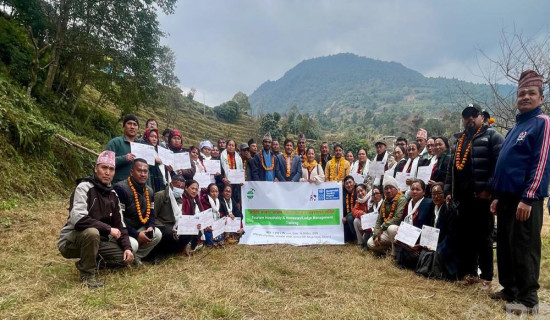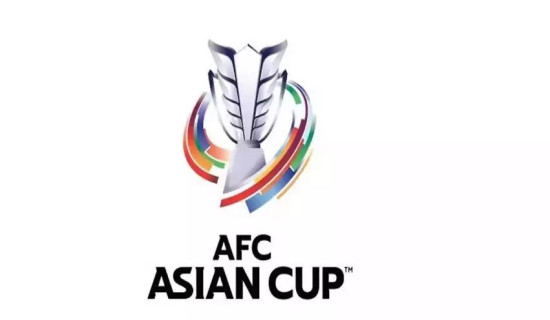- Sunday, 21 December 2025
Six Nepali climbers lead sport climbing revolution with training breakthrough
Kathmandu, June 8: Nepal participates in a few sports in the Asian Games and Olympics and earning medals in those sports while competing with better-trained athletes has always been a major challenge. In these times, a group of six experienced Nepali climbers have built a foundation to ensure Nepal starts challenging the world in sport climbing soon and win medals for the country.
The group, from June 2-6, was trained in route setting by Praveen C.M, a 38-year-old Indian national who is a professional climber, trainer and rescuer, under the coordination of Kalpana Climbing School and technical assistance of the Indian Mountaineering Foundation (IMF). The training took place at the Dhumbarahi-based Pasang Lhamu Sports and Wall Climbing Centre.
While climbing/trekking/mountaineering in the Himalayas and Hills have been common in Nepal for ages, sport climbing is new for Nepalis, and also the world.
However, unlike other popular sports, such as archery and javelin throw, that originated through activities essential in daily life centuries ago, climbing is still an emerging global sport. Sport climbing originated in the early 1980s, and the International Federation of Sport Climbing (IFSC) was founded only in 2007. In Nepal, the Nepal Climbing Sport Association (NCSA), established in 2010, oversees the country’s sport climbing.
Similarly, sport climbing debuted in the Asian Games only in 2018, and in the Olympics in 2020. Nepal was one of the 16 nations that competed in sport climbing in the Asian Games hosted by Indonesia. However, Nepal did not participate in the last Asian Games hosted by China.
Sport climbing is a sport played on a wall-like structure constructed in different designs at different wall climbing centres. Currently, there are at least half a dozen climbing centres across the Kathmandu Valley.
“We were allowed to participate in sport climbing when it debuted in the 2018 Asian Games because the sport was played only in a few Asian countries till then. In 2022, we could not qualify against better trained athletes of other countries,” said Rabindra Maharjan, President of NCSA, Lalitpur.
Rabindra, who documented and recorded the training, added, “We could neither train our athletes nor produce trainers, route setters and game officials since 2018’s Asian Games due to which the sport has remained dormant in Nepal.”
The NCSA has been organising several sports climbing events over the years; however, the stakeholders have been unable to train aspiring players professionally.
“Sport climbing has its rules, skills and techniques which the climbers should be aware of. An institution seeking to challenge international climbers in the sport should at least have route setters,” said Praveen, who also reigned as India’s national champion in sport climbing for 16 and participated in several world championship events.
Since different wall climbing centres have non-identical routes created with different types of holds and boulders, Praveen argued that route setters are the architects of sport climbing.
“A climber in Nepal should have had trained in different routes to be able to climb unique routes in climbing centres abroad. However, one cannot place holds and boulders properly without training. And the recent four-day training was to create six experienced climbers as route setters. Placing holds and boulders without proper knowledge makes a haphazard route climbable but not entertaining and challenging at the same time,” said Praveen.
Route setters design and create the routes for climbers after carefully considering factors like difficulty and safety. Therefore, need to stay updated on climbing trends and techniques to keep routes interesting and engaging for climbers of all skill levels with the help of their creativity, technical skill, and understanding of climbing movements.
The six trainees trained by Praveen were Kalpana Maharjan, Parbati Joshi, Dawa Tashi Sherpa, Raksha Raj Tamang, Pasang Lama and Jangchub Dorji Sherpa. “They are now the first six recognised route setters in the country,” said Rabindra.
The six trainees are all experienced climbers: Kalpana is the first female journalist to climb Mount Everest from both South/Nepal (23 May 2018) and North/China (23 May 2019) sides; Pasang has ascended Mount Everest nine times as a guide; and Dawa has ascended the highest peak in the world once. Similarly, Parbati, Raksha Raj and Jangchub Dorji are professional mountain climbers and trekking guides.
According to Praveen, the six trainees will receive their certificate of recognition from the IMF soon.
“We are happy to have been trained as route setters. It was a new experience despite being a professional climber for years,” informed Pasang.
“We want to use this training to help the new generation of Nepali sport climbers and make them able to challenge foreign athletes and earn medals at the Olympics and Asian Games. We are positive about it because we have seen the abilities of Nepali children and teenagers,” shared Kalpana, who is also the founder of Kalpana Climbing School.
“There are tournaments for route setters in the world as well,” Kalpana added.
According to NCSA, the six trained route setters will be utilised in the upcoming events in the sports. “The production of six route setters is a breakthrough in the history of Nepali sport climbing. They will be contributing to the development of the sport in the country. The Association plans to train more climbers as route setters as well,” said Hari Gharel, President of the NCSA.
While Nepal now has trained route setters, which is a basic need in sport climbing, the country still lacks recognised officials in the sport. Nevertheless, this problem will also be solved soon.
“The IMF plans to call some of the six trainees to India and train them as sport climbing officials. After the training in India, the graduates can start officiating and judging tournaments,” said Praveen.




-square-thumb.jpg)












